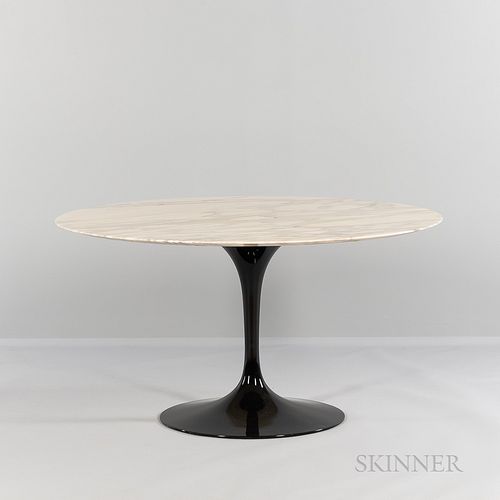Eero Saarinen (1910-1961) for Knoll International Marble-top Tulip Dining Table
Lot 1250
About Seller
Bonhams Skinner
274 Cedar Hill Street
Marlborough, MA 01752
United States
Founded over four decades ago, Bonhams Skinner offers more than 60 auctions annually. Bonhams Skinner auctions reach an international audience and showcase the unique, rare, and beautiful in dozens of categories, including the fine and decorative arts, jewelry, modern design, musical instruments, sc...Read more
Categories
About Auction
Catalog Only
By Bonhams Skinner
Jun 17, 2020 - Jun 29, 2020
Set Reminder
2020-06-17 12:00:00
2020-06-29 19:00:00
America/New_York
Bidsquare
Bidsquare : 20th Century Design
https://www.bidsquare.com/auctions/skinner/20th-century-design-5265
This sale offers over 700 lots for the discerning collector, dealer and home owner seeking furniture, art work and decorative objects spanning the 20th and early 21st centuries Bonhams Skinner bidsquare@bonhamsskinner.com
This sale offers over 700 lots for the discerning collector, dealer and home owner seeking furniture, art work and decorative objects spanning the 20th and early 21st centuries Bonhams Skinner bidsquare@bonhamsskinner.com
- Lot Description
Eero Saarinen (1910-1961) for Knoll International Marble-top Tulip Dining Table, United States, c. 1970, ht. 29, dia. 54 in.
Note: Born to world famous parents, architect and Cranbrook Academy of Art director Eliel Saarinen and textile artist Loja Saarinen, Eero Saarinen was surrounded by design his whole life. It came as no surprise that Eero was helping his father design furniture and fixtures for the Cranbrook campus by the time he was in his teens. In 1929 Eero left for Paris where he studied sculpture before enrolling in the Yale architecture program the following year. In 1934, he returned to Michigan to teach at Cranbrook, work on furniture designs, and practice architecture with his father.
It was at Cranbrook that Saarinen met Charles Eames. The two young men, both committed to the exploration of potential new materials and processes, quickly became great friends, pushing each other creatively while collaborating on several projects. The most notable outcome of their partnership was the groundbreaking collection of molded plywood chairs for the MoMA-sponsored 1940 Organic Design in Home Furnishings competition. Their collection was awarded first prize in all categories, catapulting the young designers to the forefront of the American modern furniture movement.
Saarinen also met Florence Knoll (né Schust) at Cranbrook, who at that time was a promising young protégé of Eliel Saarinen. Florence spent all of her free time with the Saarinen family, including summer vacations to Finland. Florence and Eero developed a brother-and-sister-like relationship that would last the rest of their lives. Florence later recalled that her history with Eero made him her most honest and, often, harshest critic. When Florence joined Knoll in the 1940s, it was an obvious choice for her to invite Eero to design for the company. Over the next 15 years Saarinen designed many of the most recognizable Knoll pieces, including the Tulip chairs and tables, the Womb chair, and the 70 series seating collection. (Knoll)
Estimate $800-1,200
Good. Wear consistent with age and use.
Items may have wear and tear, imperfections, or the effects of aging. Any condition statement given, as a courtesy to a client, is only an opinion and should not be treated as a statement of fact. Skinner shall have no responsibility for any error or omission. - Shipping Info
-
Please visit http://www.skinnerinc.com/services/payment-and-shipping/ for information regarding the collection of items purchased at auction.
-
- Buyer's Premium



 EUR
EUR CAD
CAD AUD
AUD GBP
GBP MXN
MXN HKD
HKD CNY
CNY MYR
MYR SEK
SEK SGD
SGD CHF
CHF THB
THB











